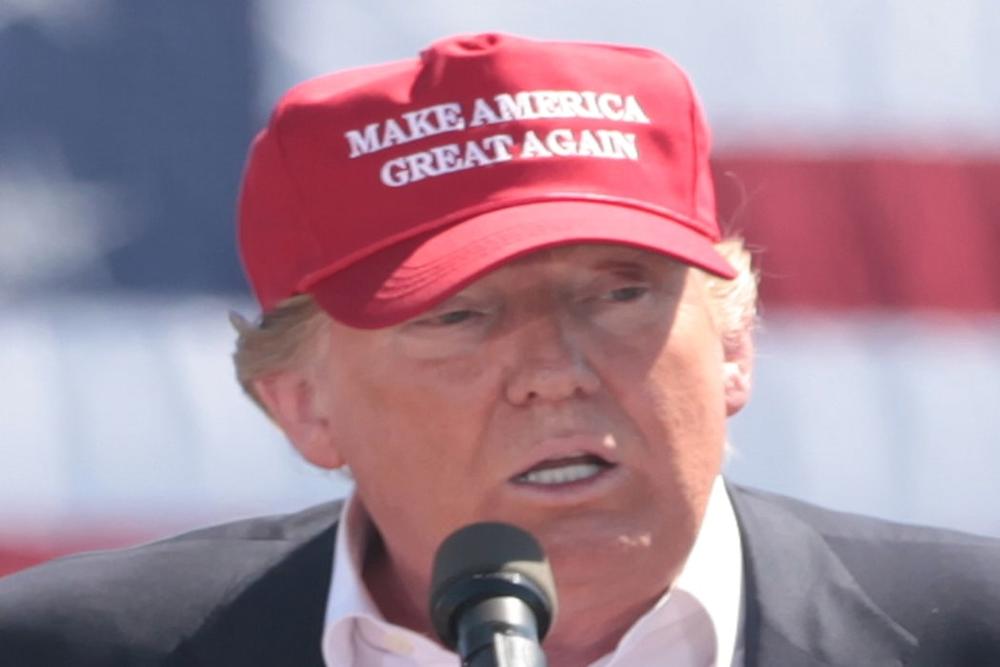How unique is the upcoming U.S. presidential election?
by Jessica Gienow-Hecht
№ 16/2020 from Oct 08, 2020
Jessica Gienow-Hecht
Is the election a historical event? Are there parallels between elections in the past and this one?
Donald Trump
Image Credit: Wikimedia Commons
Yes, it is a historical event, yes, there are parallels in the past; and yes, there is potential for uniqueness.
What's First about America First?
Donald Trump's claim to make the United States great again, to put "America First", many critics say, has in the main led to the current president dismantling democracy, creating dictatorial conditions. Thus, they conclude, the upcoming elections are "unique". However, this is not entirely correct, as a look at the election, the candidates and the campaign in its historical context shows.
First: The election(s). The 2016 election was not an accident or an aberration, but rather - just like the election campaign in which the country now finds itself - it is a symptom of the increasing political and socio-cultural division of the country. It has been looming for at least 50 years.
Since the 1990s, the situation has increasingly been characterized by a rapid escalation of violence, the swelling prison state (now supported by the private sector), bitter cultural wars and a dwindling consensus on fundamental liberal values such as freedom, community, equality, and the ability to deal with conflict and consensus.
In other words, if Trump disappears, even if he is voted out of office, Republicans will put up a candidate whose profile, values and beliefs will appeal to the segment of the population that has already voted for Trump. He - and in all likelihood it will be a "he" - will just have a different name.
Second: The candidates. Added to this is the profile of a narcissistic candidate, special perhaps in its personal composition but not in its essence.
The two Roosevelt presidents (Teddy and Franklin, 1900 and 1932) both showed narcissistic traits despite all liberal policies, as did Lyndon B. Johnson (in the 1960s), the president during whose term the Vietnam War was considerably expanded.
Here, it is striking that there is always the conviction that applicable laws are to be regarded as subordinate or even irrelevant in the context of one's own actions and striving for power.
Third: The campaign. Candidates who sought to retain power, who suspended laws (or assumed that they were not bound by the law or the constitution), and election campaigns that deeply divided U.S. society have occurred many times in US history; in fact, one could argue, it’s been a common feature early on.
In the 1800 elections, for example - recently set to music in Lin Manuel Miranda's musical "Hamilton" - Thomas Jefferson and John Adams ran against each other. Both are remembered today primarily as well-meaning, graying "founding fathers" with liberal convictions.
In fact, however, they had a terrible, vicious mud-slinging match, which was fought very publicly in the newspapers. The central issues were not much different from today: How much power should the federal government have, how much should the states have? How high should the tax rates be? How should the state deal with immigrants, especially those from Asia?
In the 1820s, Andrew Jackson won the presidential elections at the second attempt and centralized so much power on himself that observers called him "King Andrew I.".
The worst crisis in the United States brought about the most controversial election in the country's history, when in 1859 Abraham Lincoln, a candidate whose party (the "Republicans", by the way) was not represented at all in the southern states, systematically centralized power after his election in order to win the subsequent civil war for the Union. It’s an election worth looking at these days, perhaps the one closest to the current scenario in terms of both division and communication.
Even Trump's program "America First"- essentially a paraphrase of the phrase "no one will exploit the United States anymore"- is not new.
In the 1830s and around 1900, veritable cleansing programs and exclusionary programs were initiated in the United States to keep immigrants away or at least keep them down.
During World War II, there was even an "America First Committee" (AFC for short) with 800,000 members, which vehemently rejected US interference in international affairs, especially entry into war.
Since then, this rhetorical phrase has been used repeatedly, typically in an effort to tell others not to meddle.
But here is what is and would be new. Trumps profile marries the celebration of anti-elitist ignorance plus the below-the beltline campaigns of the nineteenth century on the one hand, with the expansion of control and power so typical of the state and its presidents in the twentieth century, notably after World War Two, on the other. In addition, what could be a historically unique event would be a "self-coup", that is, an attempt by a legally-elected and voted-out president using violence and breaking the law while still in office, in order to remain in office. The prerequisite would be less a permanent occupation of the White House than a co-option or even cooperation between state institutions: for example, the Supreme Court, the military, Congress. We know historical self-coups from other states and that list is long: Russia, France, Venezuela, Iran… We also know that leaders on the level of individual states in the U.S. have entertained visions of prolonged power by way of force and resistance. But for the U.S. presidency, this would be an "America First".
Jessica C.E. Gienow-Hecht is Director, John F. Kennedy Institute for North American Studies, Freie University, Berlin.

